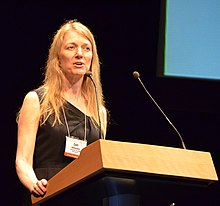Cornelia Bargmann
Cornelia Isabella Bargmann , called Cori (* 1961 in Virginia ), is an American neurobiologist.
Life
Bargmann grew up in Athens, Georgia, as the daughter of a computer science professor. She studied biochemistry at the University of Georgia with a bachelor's degree in 1981 and received her PhD in 1987 from the Massachusetts Institute of Technology (MIT) with Robert Allan Weinberg . At that time she was working on oncogenes (including cloning the Her2 gene). As a post-doctoral student in H. Robert Horvitz's laboratory at MIT, she turned to neurobiology and investigated the behavior of C. elegans , a nematode that is a preferred subject of study in neuroscience because it has exactly 302 neurons. She examined his sensory perception and the neuronal and molecular mechanisms behind his behavior and demonstrated his sense of smell (32 neurons of C. elegans are involved). In 1991 she became Assistant Professor and in 1998 Professor at the University of California, San Francisco, and from 2004 Professor at Rockefeller University ( Howard Hughes Medical Institute , HHMI).
In 2003 she discovered a molecule (SYG-1), which is important for the creation of neuronal connections in the development of C. elegans . She also identified the npr-1 gene in her laboratory, which controls whether the roundworms search for food in groups or alone. It is closely related to a human gene that plays a role in appetite and anxiety. She and her team also discovered a gene that is responsible for differentiating odors in C. elegans .
She received the W. Alden Spencer Award in 1997, the Kemali Prize in 2004, the Richard Lounsbery Award in 2009 , the Perl-UNC Neuroscience Prize in 2010 , the Kavli Prize in Neuroscience in 2012 and the Breakthrough Prize in Life Sciences in 2013 . She also received the Charles Judson Herrick Award for Comparative Neurology from the American Association of Anatomists and the Takasago Prize for olfaction research (a prize for olfactory research sponsored by Takasago International Corporation ). For 2015 she was awarded the Benjamin Franklin Medal of the Franklin Institute . She is a Fellow of the American Association for the Advancement of Science and a member of the National Academy of Sciences , the European Molecular Biology Organization (EMBO), the Norwegian Academy of Sciences , the American Philosophical Society, and the American Academy of Arts and Sciences .
She is married to the Nobel Prize winner Richard Axel .
Web links
- Website of your laboratory. rockefeller.edu(English).
- Alumnus profile at the HHMI. (English).
- Cornelia Bargmann. kavli.org, 2012(English, with autobiography).
Individual evidence
- ^ Member History: Cornelia Isabella Bargmann. American Philosophical Society, accessed April 19, 2018 (English, with short biography).
- ↑ Book of Members 1780 – present, Chapter B. (PDF; 1.2 MB) In: American Academy of Arts and Sciences (amacad.org). Retrieved April 19, 2018 .
| personal data | |
|---|---|
| SURNAME | Bargmann, Cornelia |
| ALTERNATIVE NAMES | Bargmann, Cornelia Isabella |
| BRIEF DESCRIPTION | American neurobiologist |
| DATE OF BIRTH | 1961 |
| PLACE OF BIRTH | Virginia |
